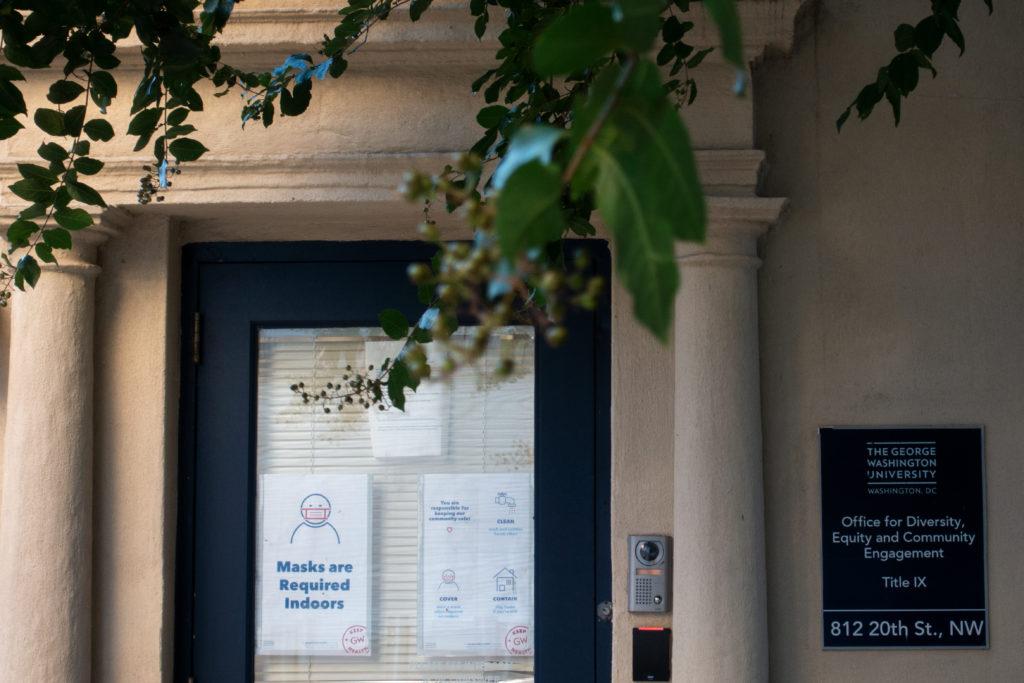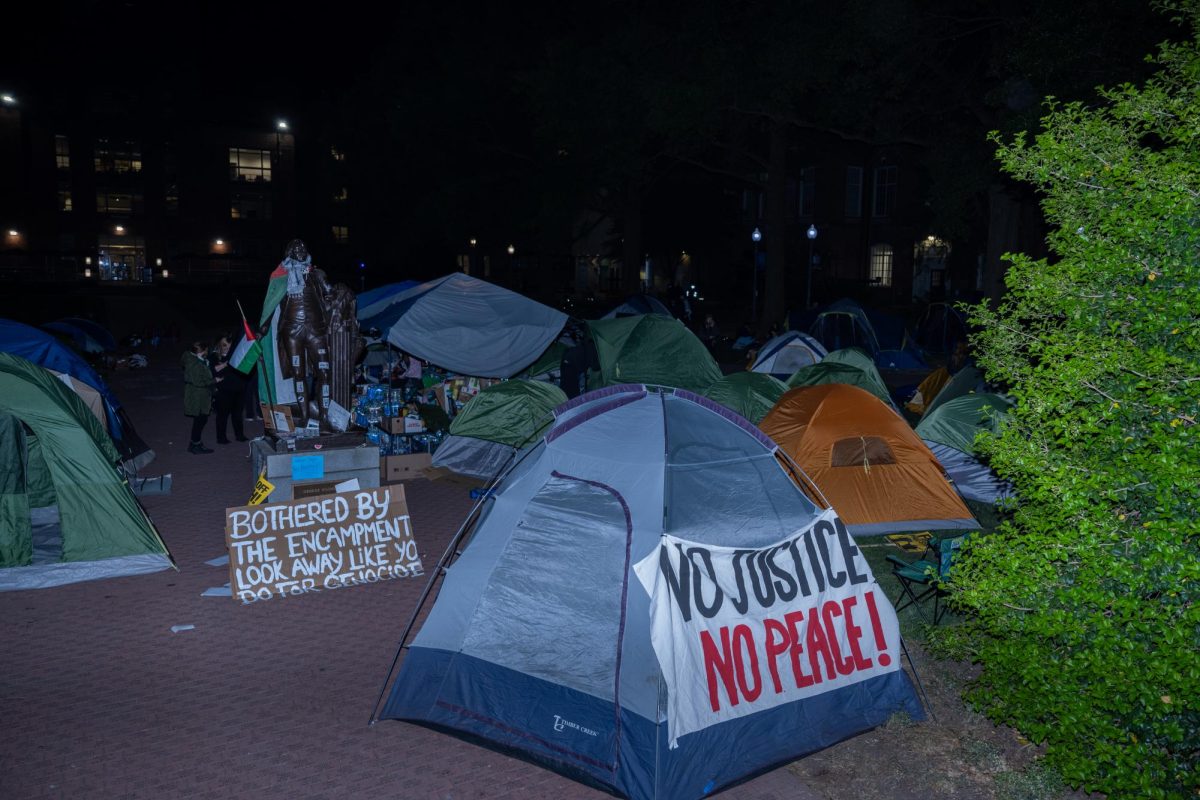Updated: Oct. 4, 2021 at 2:26 p.m.
Student leaders said the University’s response to Title IX violations failed to protect sexual assault survivors from their abusers through a lack of communication and failures to bar assailants from campus.
A string of social media posts in recent weeks raised concerns about how officials handled Title IX cases, saying they have taken months to respond to sexual assault reports and withheld barring notices without a formal notification process or documentation of evidence. Student leaders said sexual assault survivors don’t feel safe under the threat of their abusers returning to campus without punishment as a result of the University’s “unacceptable” handling of Title IX violations.
Senior Stephanie Lee, who oversees an advocacy group for sexual assault survivors called GW Protects Rapists, said the Title IX Office should hold itself accountable, and officials should outline the case reporting and barring processes to bolster communication. She said she was aware of students who planned to attend Commencement on the National Mall this weekend despite having allegedly sexually assaulted other students on campus in the past.
She said these recent graduates could return to campus because they never received barring notices from the GW Police Department, making survivors at GW feel unsafe.
“There are people that shouldn’t be graduating up there, and so we want that kind of presence to be known,” she said.
GW’s Title IX and diversity, equity and community engagement offices issued a statement late last month in response to the concerns raised on social media. Officials said they were implementing new case management software and hiring more staff to address students’ concerns.
Lee said GW Protects Rapists first formed in 2017 ahead of a commencement ceremony for the Columbian College of Arts and Sciences, where senior Aniqa Raihan – who said she was sexually assaulted at GW – protested the graduation of her assailant as he walked across the stage. She said she organized the demonstration with help and inspiration from Abby Canning, a senior who launched a petition last April to urge officials to impose stricter penalties for sexual assault.
Sexual assault survivors said they were hesitant to report their cases to the Title IX Office after hearing about officials slow response to students’ reports, according to a post on GW Survivors – an Instagram account designed to anonymously share survivors’ stories.
GW Protects Rapists organized a protest Saturday in conjunction with Commencement, when demonstrators marched from Kogan Plaza to the National Mall to pressure officials to reform their handling of sexual assault cases. The protest is the first phase of a multi-step plan to institute Title IX and campus barring process reforms, Lee said.
“We’re just going to keep pushing and after the commencement, we have other phases,” Lee said. “If you look at our Instagram, like we said, Commencement is phase one, there’s going to be more phases until we get what we want, and then our hashtag no longer stands true of ‘GW protects rapists.’”
Shira Strongin, the co-president of Students Against Sexual Assault, said the organization published a statement last Sunday demanding GWPD standardize its barring policy and clarify the process for students. The statement also called for more “long-term” funding for the Office of Advocacy and Support as SASA works to support survivors and advocate for administrative reforms.
“We’re incredibly lucky that the survivors who are leading this and organizing this have come forward to us, have been trusting us and have been allowing us to support them in this process,” Strongin said. “Everything that we’re doing is being done in collaboration with them.”
She said the Title IX Office’s statement last week was “moot” and failed to address any of SASA’s demands that members will continue voicing. Strongin said the statement focused more on officials’ reactions to students’ concerns more than the survivors who had been harmed by sexual assault.
“They are administrators, these are students who they are supposed to be protecting and these are the people who have experienced real harm,” she said. “Not Title IX Office, not any other administrators at GW. It was really about the survivors who have experienced this harm, and I think it’s a little bit ridiculous and frankly offensive for it to be framed any other way.”
University Spokesperson Crystal Nosal, said OAS is a confidential resource for those who experience sexual assault that aims to support the community as they process their experiences, and supports students who have experienced sexual assault and or anything else on the violence or harm spectrum.
“OAS presents all reporting options and healing modalities to trauma survivors so that they can make informed decisions,” she said. “OAS may serve as a resource regardless of whether trauma survivors chose to seek support from the Title IX office or GWPD.”
Caroline Laguerre-Brown, the vice provost for diversity, equity and community engagement, said the Title IX Office’s responses to sexual assault cases “took longer than they should have been” during the last academic year when only two staff members were working in the office. She said these staff members faced a “tremendous amount of pressure” handling the office’s workload that was previously split between five employees.
“We were hearing that, we acknowledge it and we’re not disputing with students that there may have been periods where their response times were just too long,” Laguerre-Brown said in an interview. “And that’s not acceptable to us.”
She said the Title IX Office is hiring four new staff members – including two investigators, a case manager and a response coordinator – efforts drawing support from interim Provost Chris Bracey. Title IX staff are meeting with students, including the co-presidents of SASA, to discuss concerns, Laguerre-Brown said.
“I sincerely believe that universities get better and stronger when student voices are raised, when their concerns are brought to administration, and that this is a difficult time, but we’re listening, and we’re going to continue to listen, and we will make ourselves available when students want to talk to us,” she said.
GWPD Chief James Tate said officers may deliver barring notices to students expelled from the University or anyone with police or court records indicating they will appear in a criminal court trial. Tate said that without these forms of documentation, officers must formally notify a subject to bar them from campus and legally arrest them for violating the barring notice.
Tate said GWPD is working to clarify its barring policy and will answer students’ questions to address concerns about the barring process.
“GWPD has no desire to protect anyone, regardless of status, who should not be on this campus,” he said. “We have no desire to do that whatsoever.”
In the statement SASA released last week, students said GWPD’s “unwillingness to believe survivors at their word” has made the barring process ineffective in preventing assailants from entering campus with the final decision left of Chief James Tate. Students also said they are concerned because survivors expressed that non-GW students are less likely to receive a barring notice.
Will Hoadley-Vrill, the co-president of SASA, said GWPD should standardize the barring process in their response to all Title IX cases and clarify how it issues a barring notice and who is susceptible to one. He said Tate’s authority to determine who receives a barring notice has stirred concerns that officials could make decisions based on a student’s “wealth and status.”
“Discretion is not sufficient to protect survivors,” he said. “So we need standardization, we need to know what factors are considered when this barring is either chosen to be implemented or not. And we need to know how these decisions are come to because, at this point, we don’t know.”
This post has been updated to correct the following:
The Hatchet incorrectly reported that the Title IX Office is hiring four new staff members, including two investigators, a case manager and a response coordinator. Officials already hired the two investigators and case manager. We regret this error.








